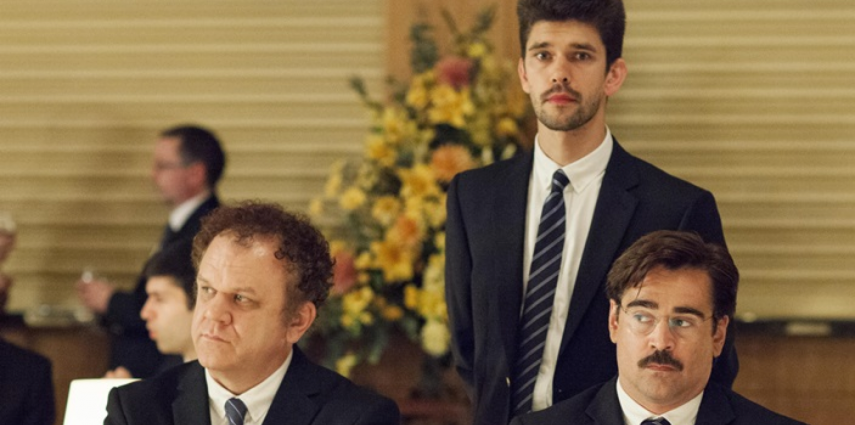THE LOBSTER
Director: Yorgos Lanthimos
Stars: Colin Farrell, Rachel Weisz, Léa Seydoux, John C. Reilly
Rating: * * * * (out of 5)
INSANITY CLAWS
That terrible, terrible seafood gag, “when I sea food, I eat it”, kind of applies to Greek filmmaker Yorgos Lanthimos’s savagely funny and ultimately tragic The Lobster. As with his previous, critically acclaimed films Dogtooth and Alps, Lanthimos can’t envisage a film scenario without preparing it to his own deadpan, surrealist recipe of identity crisis and twisted communication.
Here, in a totalitarian dystopia, singledom is outlawed. Anyone unattached is sent to The Hotel, where they’re given forty-five days to find a suitable – read: with matching trait or flaw – mate. If they can’t successfully pair up, they’re transformed into the animal of their choice. And in the meantime, hotel guests are sent out into The Woods, to hunt down a renegade group of Loners who have escaped the system.
Working for the first time in English with international stars, Lanthimos and co-writer Efthymis Filippou eagerly get their claws this bigger surreal canvas, a world that Franz Kafka or Luis Bunuel and Salvador Dali would relish. Instead of Un Chien Andalou, meet their Grecian crustacean.
Our potential lobster – smartly chosen for its hundred-year lifespan and lifelong fertility – is paunchy sad-sack David (Farrell), abandoned by his wife and promptly shipped off to the Hotel. Many of the film’s comic highlights come as he and the audience first experience the new rules of the game. David’s stay begins with having one hand shackled behind his back, so as to better understand the importance of two. Staff perform workshops demonstrating the necessity of coupledom – how, for instance, would a singleton perform a Heimlich manoeuvre on himself? And the officious Manager (a wonderfully droll Olivia Colman) cautions that even in animal form, species pairings must remain constant: a wolf and a penguin, for instance, cannot live together, because “that would be absurd.”
That line neatly encapsulates the film’s warped logic, seemingly ridiculous yet just grounded enough to reveal the assumptions and rituals of modern relationships and matchmaking. It’s a fine line to tread and, initially at least, the film is a brilliant tonal balancing act. As in Lanthimos’s previous films, the outrageous behaviour unleashed clashes against the actors’ flat, near-monotone line delivery, which in turn sparks against a dramatic, largely classical score. One moment you’re howling with laughter, the next with despair. And when a hapless guest’s suicide is described as leaving “blood and biscuits everywhere”, only you know which is which.
These unfortunate singletons are known only by their defining traits – Ben Whishaw’s Limping Man or John C. Reilly’s Lisping Man, whose choice of a parrot is mocked, given his speech impediment, for selecting one of the few animals who can talk. Bizarrely, the actors’ understated performances make the characters’ desperation and longing even more palpable. Just as the sterile formality of the Hotel – like a downmarket version of The Shining’s Overlook – only enhances the slow creep of oppressive dread.
When David does eventually make a run for it, however, and joins the forest-dwelling Loners, he finds that their steely leader (current Bond star Léa Seydoux) has only swapped one sort of fundamentalism for another. Here, couples are forbidden. Any physical or emotional intimacy is severely punished. The only dancing permissible is solo and – in a brilliant sight gag presumably inspired by those silent flash mobs – to electronic music. So when David starts to fall for a fellow Loner (Rachel Weisz, who’s been clinically narrating the story from the beginning), this former wannabe Lobster, though now seemingly free, may be inching ever closer to a boiling pot anyway.
There’s so much to admire here, from the performances (Farrell and Weisz are quietly heartbreaking), to the muted look of the lush, rural Irish locations, to the sheer inventiveness of the world, that it’s hard to pinpoint exactly where the script’s straining to constantly top its surrealist flourishes starts to crack its own lovingly constructed shell. An ending that fizzles out in metaphor and ambiguity feels, strangely, predictable.
The wacky factor and alienated tone may have put some off long before this point. But if you recognize the film’s true DNA, you’ll find that for all that Lanthimos’s Lobster looks, compared to most movies, an entirely different species, beneath the absurd surface, it’s fierce humour and plaintive desire for intimacy is something all-too human.
Verdict:
Dazzling in its sinister surrealism, wicked black comedy and touching pathos, The Lobster is a rare, dangerous beast, but one that its recognisable, excellent cast might just push towards a wider appreciation. If the tail end sinks a little, this is still a gourmet movie for everyone to feast on.
Rating:
8.5
To read the original article at IGN.com, click here: The Lobster review
